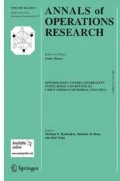Abstract
We provide simple constructive proofs of balancedness of classes of m-PS (m-Parallel Sequencing) games, which arise from sequencing situations with m parallel machines. This includes the setting that is studied by Calleja et al. (2001) and Calleja et al. (2002), who provided a complex constructive proof and a simple non-constructive proof of balancedness of a restricted class of 2-PS games, respectively. Furthermore, we provide a counterexample to illustrate that our balancedness results cannot be extended to a general setting.
Similar content being viewed by others
References
Bondareva, O. (1963). “Certain Applications of the Methods of Linear Programming to the Theory of Cooperative Games (In Russian).” Problemy Kibernetiki 10, 119–139.
Calleja, P., P. Borm, H. Hamers, and F. Klijn. (2001). “On a New Class of Parallel Sequencing Situations and Related Games.”CentER Discussion Paper 2001-03, Tilburg University, Tilburg, The Netherlands.
Calleja, P., P. Borm, H. Hamers, F. Klijn, and M. Slikker. (2002). “On a New Class of Parallel Sequencing Situations and Related Games.” Annals of Operations Research 109, 265–277.
Curiel, I., H. Hamers, and F. Klijn. (2002). “Sequencing Games: A Survey.” In Borm, P. and Peters, H., (eds.), Chapters in Game Theory (In Honor of Stef Tijs) Kluwer Academic Publishers, Boston, pp. 27–50.
Curiel, I., G. Pederzoli, and S. Tijs. (1989). “Sequencing Games.” European Journal of Operational Research 40, 344–351.
Curiel, I., J. Potters, V. Rajendra Prassad, S. Tijs, and B. Veltman. (1993). “Cooperation in One-Machine Scheduling.”Zeitschrift für Operations Research 38, 113–129.
Curiel, I., J. Potters, V. Rajendra Prassad, S. Tijs, and B. Veltman. (1994). “Sequencing and Cooperation.“ Operations Research 42, 566–568.
Hamers, H., F. Klijn, and J. Suijs. (1999). “On the Balancedness of Multiple Machine Sequencing Games.” European Journal of Operational Research 119, 678–691.
Hamers, H. and M. Slikker. (1995). “The PEGS-Rule for Probabilistic Sequencing Situations.” Cahiers du Centre dÉtudes de Recherche Opérationelle 37, 109–119.
Pritsker, A., L. Miller, and R. Zinkl. (1971). “Sequencing n Products Involving m Independent Jobs on m Machines.” A.I.I.E. Transactions 3, 49–60.
Shapley, L. (1967). “On Balanced Sets and Cores. “Naval Research Logistics Quarterly 14, 453– 460.
Slikker, M. (2003). “An m-Sequencing Game with an Empty Core.” BETA Working Paper 94, Technische Universiteit Eindhoven, Eindhoven, The Netherlands.
van den Nouweland, A., M. Krabbenborg, and J. Potters. (1992). “Flow-Shops with a Dominant Machine.” European Journal of Operational Research 62, 38–46.
Author information
Authors and Affiliations
Corresponding author
Rights and permissions
About this article
Cite this article
Slikker, M. Balancedness of Sequencing Games with Multiple Parallel Machines. Ann Oper Res 137, 177–189 (2005). https://doi.org/10.1007/s10479-005-2253-8
Issue Date:
DOI: https://doi.org/10.1007/s10479-005-2253-8




